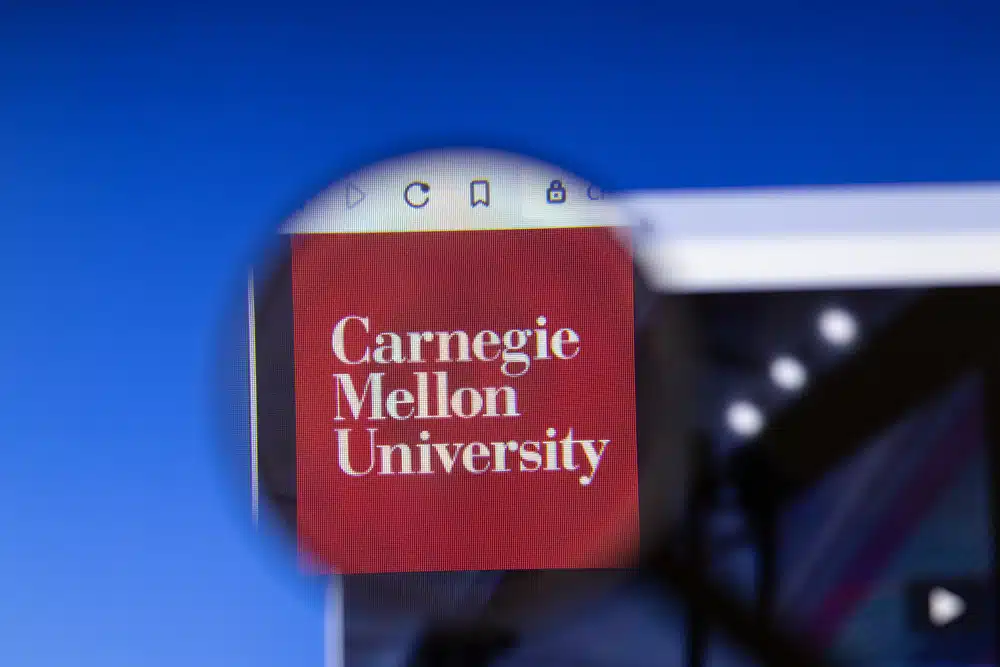Carnegie Mellon Early Decision and Regular Decision Deadlines 2023-2024
Welcome to a detailed guide focusing on the Carnegie Mellon Early Decision deadline 2023-2024 and the Carnegie Mellon Regular Decision deadline 2023-2024. If you are planning to apply to Carnegie Mellon University for the upcoming academic year, this guide is designed to provide you with all the essential information.
Whether you’re considering the binding commitment of Early Decision or the more flexible Regular Decision, understanding these key deadlines is vital for a successful application to one of the top universities in the United States.
Does Carnegie Mellon Have Early Decision?
Carnegie Mellon University offers an Early Decision application plan, a binding agreement signifying the university as your top choice. This section will delve into what Early Decision entails, helping you decide if this path aligns with your academic goals and preferences.
The Binding Nature of Early Decision
Early Decision at Carnegie Mellon is not just a preference but a commitment. If you choose this route and are accepted, you are expected to enroll at Carnegie Mellon and withdraw applications from other institutions. This decision should be made after careful consideration and certainty that Carnegie Mellon is your dream school.
Early Decision Plans: ED1 and ED2
Carnegie Mellon University provides two distinct Early Decision options – Early Decision 1 (ED1) and Early Decision 2 (ED2) – each with its own deadlines and characteristics. These plans are tailored to accommodate the different needs and preparedness levels of prospective students for the 2023-2024 academic year. It’s crucial to understand the nuances of these options as they play a significant role in your application strategy.
Early Decision 1 (ED1) is designed for students who have identified Carnegie Mellon as their first choice early in their senior year. It is an ideal option for those ready to commit and looking to receive an admissions decision earlier in the application cycle. By choosing ED1, you demonstrate a clear preference for Carnegie Mellon, which can be a strong statement of intent to the admissions committee.
Early Decision 2 (ED2) offers another opportunity for students who decide later in their senior year that Carnegie Mellon is their top choice. This option is particularly beneficial if you need more time to strengthen your application, explore your options, or if your interest in Carnegie Mellon solidifies later in the year. ED2 still allows you to express your committed interest in Carnegie Mellon but provides additional time to prepare a compelling application.
When is the Carnegie Mellon Early Decision Deadline?
The deadlines for Carnegie Mellon’s Early Decision plans are pivotal in shaping your application strategy. They not only signify important dates but also represent your commitment to your higher education journey. In this detailed guide, we will delve into the deadlines for both Carnegie Mellon Early Decision 1 and Early Decision 2 for the 2023-2024 academic year, ensuring you have all the necessary information to plan accordingly.
Early Decision 1 Deadline
Mark your calendars: the Early Decision 1 deadline for Carnegie Mellon University is set for November 1, 2023. This date is crucial for those of you who have already decided that Carnegie Mellon is your top choice university. Applying by this deadline indicates a strong level of preparation and a clear commitment to your academic future.
It’s an opportunity to demonstrate that you’ve thoughtfully considered your options and have decisively chosen Carnegie Mellon. Remember, meeting this deadline shows the admissions committee your dedication and readiness to embark on this significant phase of your education.
Early Decision 2 Deadline
For those who find their heart set on Carnegie Mellon a bit later in the application cycle, the university offers the Early Decision 2 plan. The deadline for this plan is January 3, 2024. This allows you additional time to weigh your options and decide if Carnegie Mellon truly aligns with your academic and career aspirations.
Applying for Early Decision 2 can be a strategic choice, especially if you’ve had recent academic achievements or extracurricular accomplishments that bolster your application. It’s also a fitting choice if you’ve had a change of heart after November 1 and now see Carnegie Mellon as your dream school.
Keep in mind that this deadline, like Early Decision 1, is a binding commitment, meaning that if you’re accepted, you agree to enroll at Carnegie Mellon and withdraw applications from other institutions.
Meeting the Carnegie Mellon Early Decision deadline, whether it’s for ED1 or ED2, is more than just submitting your application on time. It reflects a well-thought-out decision, showcasing your dedication and readiness for the rigorous academic environment that Carnegie Mellon offers.
By understanding these deadlines and their significance, you can strategically plan your application process, ensuring it aligns with your educational goals and aspirations for the 2023-2024 academic year.
When is the Carnegie Mellon Regular Decision Deadline?
When planning your application to Carnegie Mellon, understanding the Regular Decision deadlines for the 2023-2024 academic year is crucial. This non-binding path provides the flexibility to consider Carnegie Mellon thoroughly without the immediate commitment demanded by Early Decision plans. This non-binding application route offers you the flexibility to choose Carnegie Mellon without the immediate commitment required by Early Decision plans.
It’s a choice that allows for more comprehensive consideration and comparison of your college options. In this section, we’ll provide an in-depth look at the Regular Decision deadline for the 2023-2024 academic year, helping you to plan effectively and make informed decisions about your college future.
Regular Decision Deadline for Most Programs
The key date to remember for Regular Decision applicants to most programs at Carnegie Mellon is January 3, 2024. This deadline is pivotal as it gives you ample time to refine your application, ensuring that it showcases your strengths and aligns with the university’s expectations.
Applying by this deadline means you have taken the time to thoroughly prepare your application, reflecting on your academic achievements, extracurricular activities, and personal growth. It’s an opportunity to present a well-rounded portrait of yourself, one that goes beyond test scores and grades, highlighting your unique talents, experiences, and aspirations.
Applying for Regular Decision also provides you with the advantage of having additional time to gather your materials, seek feedback on essays, and maybe even improve certain aspects of your application, such as your SAT or ACT scores. This deadline aligns with most other universities’ Regular Decision timelines, allowing you to compare financial aid offers and make a well-informed choice about where to enroll.
Remember, applying for Regular Decision at Carnegie Mellon does not diminish your chances of acceptance; rather, it allows you a broader perspective in your college selection process.
Special Deadlines for Specific Schools
For prospective students targeting specialized programs at Carnegie Mellon University, particularly in the Schools of Drama and Music, it’s crucial to be aware of the specific Regular Decision deadlines that differ from other programs. These programs have set an earlier Regular Decision deadline of December 1, 2023. This adjusted timeline is critical to manage due to the unique requirements and processes involved in these disciplines.
The earlier deadline for these schools is designed to accommodate the in-depth review process that often includes auditions, portfolio reviews, or detailed project submissions. Such components are integral to the admissions process for these specific programs and require careful preparation and attention to detail. If your aspirations lie in the realms of drama or music, understanding and preparing for this earlier deadline is essential.
For drama and music applicants, this means you have to start preparing your application materials well in advance. Auditions and portfolios are not just about showcasing your talent; they are also reflections of your dedication, creativity, and suitability for the rigorous and vibrant environment of these specific schools. Therefore, it’s recommended to start preparing your audition pieces or portfolio early, ensuring they meet Carnegie Mellon’s high standards.
In addition to preparing your artistic materials, you should also focus on the other aspects of your application. This includes ensuring your academic records, letters of recommendation, and personal essays are aligned with the earlier deadline. Your essays should reflect not only your passion and talent in drama or music but also how you see yourself contributing to and benefiting from the unique opportunities at Carnegie Mellon.
Moreover, these specialized programs often have limited spots, making the admission process even more competitive. By adhering to the earlier deadline of December 1, 2023, and submitting a well-rounded and polished application, you demonstrate your commitment and readiness for the challenges and opportunities these prestigious programs offer.
Meeting these earlier deadlines is critical, as it allows the admissions committees sufficient time to thoroughly review the additional artistic materials you submit. This process is not just about academic evaluation; it’s about assessing your creative talents and potential contribution to Carnegie Mellon’s vibrant artistic community. Therefore, paying close attention to these specific deadlines and preparing your application materials accordingly is key to ensuring your talents are given the consideration they deserve.
In summary, understanding and adhering to the Carnegie Mellon Regular Decision deadline for the 2023-2024 academic year is crucial in your application process. Whether you are applying for the majority of programs with a January deadline or aiming for the specialized programs with an earlier date in December, being well-informed and prepared will significantly enhance your application experience.
By meeting these deadlines, you demonstrate your organizational skills, commitment to your academic future, and ability to manage important deadlines – qualities that are highly valued at Carnegie Mellon.
What Time is Carnegie Mellon’s Early Decision Due?
When it comes to applying for Early Decision at Carnegie Mellon, timing is just as critical as the deadline date itself. In this section, we will delve into the specific timing details for both Early Decision 1 (ED1) and Early Decision 2 (ED2) deadlines. Understanding the exact timing is essential to ensure your application is submitted punctually and considered for the correct admission plan.
Deadline Timing for ED1 and ED2
The deadlines for both Carnegie Mellon Early Decision 1 and Early Decision 2 are meticulously set at 11:59 PM Eastern Time on their respective due dates. This precise timing is chosen to accommodate applicants from various time zones, allowing you to submit your application by the end of the day, regardless of your geographical location.
For ED1, this means having your complete application in by 11:59 PM Eastern Time on November 1, 2023. Similarly, for ED2 applicants, the cut-off time is the same on January 3, 2024.
This uniform timing is crucial in maintaining fairness and consistency in the application process. It ensures that all applicants, regardless of where they are in the world, have until the very end of the specified day to finalize and submit their applications.
To manage this deadline effectively, it is advisable to understand the time zone differences between your location and Eastern Time. This awareness will help you plan your submission process, ensuring that you’re not caught off guard by time zone discrepancies.
Importance of Adhering to Deadline Timing
The significance of adhering to the deadline for Carnegie Mellon’s Early Decision cannot be emphasized enough. The deadlines, set for November 1 for ED1 and January 3 for ED2 in the 2023-2024 application cycle, are strict cutoff points.
Failing to submit your application on time, even in a matter of minutes, can have major implications. A late submission, regardless of the reason, may result in your application being shifted from the Early Decision pool to the Regular Decision pool. This change is not just a matter of different timelines; it fundamentally alters the nature of your application and how it’s perceived by the admissions committee.
Early Decision is more than a choice of deadline; it’s a signal of your commitment and eagerness to attend Carnegie Mellon. By applying Early Decision, you’re telling the admissions team that Carnegie Mellon is your top choice and that you have a dedicated interest in being part of their community. This commitment is often viewed favorably, as it aligns with the university’s desire to admit students who are genuinely enthusiastic about joining their academic environment.
In contrast, Regular Decision applications are considered within a different context. While still a valid and important route to admission, the Regular Decision process doesn’t carry the same level of commitment implication as Early Decision. Additionally, acceptance rates between these two pools can vary, with Early Decision applicants sometimes having a different probability of acceptance due to their demonstrated commitment.
To avoid the unintentional shift to Regular Decision, it’s crucial to plan your application submission carefully. Be mindful of the time zone differences, as the deadlines are based on Eastern Time. Allow for potential last-minute technical glitches by aiming to submit your application well before the actual deadline.
This precaution not only ensures that you meet the deadline but also provides peace of mind, knowing that your application will be considered within your preferred admission plan.
Utilizing Time Management Strategies
To successfully meet the Early Decision deadlines, effective time management strategies are essential. Consider the following tips:
- Create a Timeline: Establish a timeline leading up to the deadline. Include milestones for completing different parts of your application, such as essays, gathering recommendations, and finalizing your portfolio or audition materials (if applicable).
- Plan for Technical Contingencies: Given the possibility of technical issues, aim to submit your application well before the final deadline. This approach not only secures your submission on time but also provides a buffer for addressing any unexpected technical glitches.
- Regular Check-Ins: As the deadline approaches, regularly check your progress against your timeline. This practice helps in ensuring that you are on track and can make adjustments if necessary.
Reviewing Application Components
A thorough review of all application components before submission is crucial. Ensure that each part of your application, from academic transcripts to personal essays, is complete, accurate, and truly reflects your capabilities and aspirations. This step is not just about meeting the deadline but also about submitting an application that best represents your potential as a candidate for Carnegie Mellon University.
In conclusion, understanding and respecting the timing for Carnegie Mellon’s Early Decision deadlines is a key aspect of your application process. Whether you’re applying for ED1 or ED2, make sure to align your preparation and submission plans with the 11:59 PM Eastern Time cutoff. This careful attention to timing demonstrates your organizational skills and commitment, two qualities that are highly valued in the competitive environment of Carnegie Mellon University.
How to Apply to Carnegie Mellon Early Decision
To apply to Carnegie Mellon through Early Decision for the 2023-2024 academic year, a process that contrasts with the Regular Decision deadline, you must follow a series of well-defined steps. This binding decision is more than just an application; it’s a commitment to your future in an environment that fosters innovation and academic excellence.
The process demands attention to detail and an understanding of the timelines and requirements. Let’s break down these steps, ensuring you can approach this decision with confidence and clarity.
Understanding the Early Decision Option
Before diving into the application process, it’s crucial to comprehend what Early Decision entails. Applying for Early Decision means that Carnegie Mellon is your first choice, and if admitted, you agree to enroll and withdraw applications to other institutions. This commitment underscores the importance of being certain that Carnegie Mellon is where you see yourself thriving academically and personally.
Step-by-Step Application Process
Navigating the Early Decision application to Carnegie Mellon requires careful planning and a methodical approach. Here’s a guide to help you through this crucial process:
1. Selecting Your Early Decision Plan:
When considering an application to Carnegie Mellon University, your first step is to decide between Early Decision 1 (ED1) and Early Decision 2 (ED2). This choice should be based on your readiness and confidence in Carnegie Mellon as your top choice university.
If you’re prepared to commit early in your senior year, ED1, with a deadline of November 1, is the appropriate choice. However, if you need more time to decide, ED2, with a deadline of January 3, offers additional flexibility.
2. Gathering Application Materials:
The next crucial step is compiling all necessary application materials. This includes your academic transcripts, which provide a comprehensive record of your academic journey. You also have the option to submit standardized test scores, although they are not mandatory.
Personal essays are a significant part of your application, offering a window into your personality, aspirations, and how you see yourself contributing to and benefiting from the Carnegie Mellon community.
Letters of recommendation should ideally come from individuals who can provide insight into your academic abilities and character. Depending on the program you’re applying to, additional materials such as portfolios or auditions may be required, especially for programs in the arts. It’s essential that each component of your application highlights your strengths and demonstrates alignment with Carnegie Mellon’s values and ethos.
3. Finalizing Your Application:
Once you’ve gathered all the components, it’s time to finalize your application. This involves a thorough review to ensure accuracy and completeness. Each part of your application should reflect your best qualities and adhere to the university’s requirements.
It’s crucial to be mindful of the submission deadlines: November 1 for ED1 and January 3 for ED2. Adhering to these deadlines is critical in demonstrating your organizational skills and commitment.
4. Submitting Your Application:
After ensuring that every part of your application is complete and reflects your best self, the next step is submission. You’ll need to complete and submit the application form along with all supporting documents. It’s important to strictly adhere to the deadlines specific to your chosen Early Decision plan, as late submissions could impact the consideration of your application.
5. Signing the Early Decision Agreement:
If you are admitted under the Early Decision plan, a significant step is signing the Early Decision Agreement. This document is a formal commitment to enroll at Carnegie Mellon and to withdraw applications from other institutions. It’s a binding agreement that underscores the seriousness of your choice. Be mindful of the enrollment deposit due dates, which are February 1 for ED1 and February 15 for ED2.
6. Waiting for the Admission Decision:
Finally, after submitting your application, you will await the admission decision. Decisions are typically communicated between December 10 and February 1. Being accepted under Early Decision is a binding commitment, meaning if admitted, you are expected to enroll at Carnegie Mellon and withdraw other college applications.
Please note that Carnegie Mellon does not have an Early Action option. Applying under the Early Decision plan is a binding agreement to enroll if admitted. This decision should be made after thorough consideration, ensuring Carnegie Mellon is your top choice for your future academic pursuits.
Careful attention to each step of this process not only ensures a complete and timely application but also demonstrates your commitment to pursuing your educational goals at Carnegie Mellon University.
Additional Tips for Early Decision Application
Preparing for the Interview Process
A key component of the Early Decision application at some universities, including Carnegie Mellon for certain programs, can be the interview process. While not all programs require an interview, for those who do, it’s an opportunity to make a personal impression and strengthen your application. Preparing for this potential aspect involves:
- Researching Common Interview Questions: Familiarize yourself with typical college interview questions and reflect on your responses. These questions often explore your academic interests, reasons for choosing Carnegie Mellon, and how you envision contributing to the campus community.
- Understanding Program-Specific Nuances: If your chosen program often includes interviews as part of the application process, delve into the specific qualities and experiences they might be looking for. Tailor your preparation to highlight how your background and aspirations align with the program’s focus.
Financial Planning and Scholarships
Another crucial aspect of the Early Decision application process is understanding and planning for the financial implications of attending Carnegie Mellon. This includes:
- Researching Financial Aid Options: Investigate Carnegie Mellon’s financial aid policies and what types of aid are available for Early Decision applicants. Understand the process for applying for financial aid and the types of documents you’ll need to submit.
- Exploring Scholarship Opportunities: Look into scholarships offered by Carnegie Mellon and external organizations. Some scholarships have early deadlines, so it’s important to start this research early in your application process.
Reviewing Program-Specific Requirements
Different programs at Carnegie Mellon may have unique requirements or expectations. It’s important to:
- Check for Additional Requirements: Some programs may require supplemental essays, portfolios, or specific coursework. Ensure you are aware of and can meet these additional requirements.
- Seek Guidance if Needed: If you are unsure about any program-specific requirements or how to present them in your application best, seek advice from school counselors, teachers, or Carnegie Mellon’s admissions office.
In conclusion, applying to Carnegie Mellon, whether through Early Decision or considering the Regular Decision deadline for the 2023-2024 academic year, requires a detailed preparation strategy.
This involves not just meeting deadlines but also understanding the interview process, planning financially, and complying with program-specific requirements. Such a meticulous approach to each aspect of your application highlights your commitment and readiness to become part of the distinguished Carnegie Mellon community.
How Many Students Apply to Carnegie Mellon Early Decision and Regular Decision?
Understanding the volume of applications received by Carnegie Mellon University through both Early Decision and Regular Decision helps to paint a picture of the admissions competition, especially as you consider the deadlines for these options for the 2023-2024 academic year.
The number of students applying via Early Decision typically reflects a group of applicants highly committed to Carnegie Mellon as their first choice, while those applying via Regular Decision may be considering multiple options.
This distinction influences the dynamics of the applicant pool, with Early Decision applicants often showing a different level of preparedness and certainty. Knowing these figures helps in strategizing your application, whether you’re aiming for the focused commitment of Early Decision or the broader considerations of Regular Decision.
Application Numbers and Trends
Every year, Carnegie Mellon sees a substantial number of applications, both through Early Decision and Regular Decision. These numbers are indicative of the university’s high standing and the value students place on a Carnegie Mellon education.
For instance, in the 2023-2024 admission cycle, the university may receive thousands of applications, with only a fraction gaining admission. This high volume of applicants results in a competitive admission process, especially for sought-after programs.
In terms of trends, Early Decision applications are generally fewer than Regular Decision, as they require a binding commitment to attend if accepted. This path is often chosen by those who have decided that Carnegie Mellon is their unequivocal first choice.
On the other hand, Regular Decision attracts a larger pool of applicants. These are students who are still weighing their options or who may prefer the flexibility of non-binding offers to compare financial aid packages or program offerings.
Understanding these trends is essential in strategizing your application. Early Decision might offer a higher chance of acceptance, as it demonstrates a strong commitment to Carnegie Mellon, but it also demands certainty about your college choice.
Contextualizing Application Numbers
While the sheer number of applications is important, it’s equally vital to understand what these figures mean in the context of Carnegie Mellon’s selective admission process.
A high number of applicants means increased competition, but it also reflects the diverse and talented pool you will be a part of. This diversity enriches the learning environment, contributing to the dynamic and innovative culture of Carnegie Mellon is known for.
The selectivity of Carnegie Mellon, as reflected in these numbers, underscores the need for your application to stand out. It’s not just about grades and test scores; the university seeks students who will contribute uniquely to its community. This could be through innovative thinking, creative pursuits, leadership experiences, or community involvement.
When considering whether to apply Early Decision or Regular Decision, reflect on how your application can shine in a competitive pool. Early Decision might be the right choice if you’re confident that Carnegie Mellon is your top choice and you want to demonstrate that commitment.
If you’re still exploring your options or need more time to strengthen your application, Regular Decision could be a better path, allowing you the opportunity to be part of a larger, diverse applicant group and to compare offers from different universities.
In conclusion, understanding the number of applicants for Carnegie Mellon’s Early Decision and Regular Decision can significantly influence your application strategy. Whether you choose the focused path of Early Decision or the broader approach of Regular Decision, ensure your application highlights your unique qualities and aligns with Carnegie Mellon’s values and academic rigor.
Should I Apply Early Decision to Carnegie Mellon?
Deciding to apply Early Decision to Carnegie Mellon, especially given the Early Decision and Regular Decision deadlines for the 2023-2024 academic year, is a significant choice that hinges on your academic goals and preferences.
Early Decision is not just a choice about where you wish to study; it’s a binding commitment that indicates Carnegie Mellon is your top choice for higher education. Let’s explore the key factors to consider in determining if Early Decision is the most suitable path for you.
Assessing Your Commitment
The first step in deciding whether to apply Early Decision to Carnegie Mellon for the 2023-2024 academic year involves an honest evaluation of your commitment to the university.
This decision should be based on more than just academic reputation or rankings; it should reflect a deep alignment with the university’s culture, values, and the specific program you are interested in. Consider the following aspects:
- Alignment with Academic and Career Goals: Does Carnegie Mellon offer programs and opportunities that align closely with your academic interests and career aspirations?
- Campus Culture and Environment: Are you excited about being part of the Carnegie Mellon community? Does the campus culture resonate with your personality and preferences?
- Financial Considerations: Are you prepared to commit to Carnegie Mellon without comparing financial aid offers from other universities? Remember, Early Decision applicants do not have the opportunity to compare financial aid packages.
Early Decision is ideal if you have a long-standing aspiration to attend Carnegie Mellon and are confident that it is the best fit for your academic and personal growth.
Understanding the Implications
Choosing to apply Early Decision to Carnegie Mellon carries significant implications. It’s a binding agreement, meaning that if you are admitted, you are committed to attending Carnegie Mellon and must withdraw all other college applications. This decision demands careful consideration of the following factors:
- Binding Nature of Early Decision: Understand that if accepted, there is a moral and ethical obligation to enroll at Carnegie Mellon. This commitment should be made with confidence and clarity.
- Readiness to Commit: Are you ready to make a definitive college choice early in your senior year? Early Decision is suitable for students who have thoroughly researched and are certain about their college choice.
- Application Readiness: Is your application strong enough at this stage? Early Decision applications are due earlier, so you need to be ready with all components of your application, including standardized test scores, essays, and recommendations.
The decision to apply Early Decision should not be taken lightly. It requires a deep understanding of what you want from your college experience and a certainty that Carnegie Mellon is the right place to fulfill those aspirations. If you resonate with the unique offerings of Carnegie Mellon and are prepared for the commitments and implications of an Early Decision application, this path might be the right choice for you.
However, if you prefer more time to explore options, compare offers, or further develop your application, then Regular Decision might be a more suitable option.
In conclusion, applying Early Decision to Carnegie Mellon requires careful deliberation and self-reflection. It’s about assessing your readiness, understanding the binding commitment, and ensuring that your application showcases your strengths and alignment with the university’s ethos. This decision can set the course for your future academic and professional journey, so it’s crucial to make an informed and confident choice.
What Are the Odds of Getting Into Carnegie Mellon for Early Decision?
Understanding the odds of getting into Carnegie Mellon University through Early Decision is crucial, especially as you consider the Early Decision and Regular Decision deadlines for the 2023-2024 academic year.
Carnegie Mellon’s reputation as a top-tier university means its admission process is highly competitive, and this holds especially true for Early Decision applicants. In this section, we’ll explore the acceptance rates for Early Decision applicants and discuss how these figures can guide your application approach.
Analyzing Acceptance Rates
The acceptance rates for Carnegie Mellon’s Early Decision applicants offer valuable insights into the competitive nature of the admissions process. Typically, these rates fluctuate each year, influenced by the overall applicant pool’s strength and the university’s enrollment goals.
For the 2023-2024 academic year, while exact numbers vary, the acceptance rate for Early Decision applicants is generally expected to be higher than that of Regular Decision applicants. This trend is often attributed to the binding commitment demonstrated by Early Decision applicants, signaling their strong desire and commitment to attend Carnegie Mellon.
Breaking down these statistics further, it’s essential to consider the context behind them. For example, certain programs within Carnegie Mellon might have higher or lower acceptance rates due to the number of applicants and the program’s specific criteria. Programs in computer science, engineering, and fine arts are often highly sought after, which might affect their respective acceptance rates.
How Acceptance Rates Inform Your Strategy
Understanding these acceptance rates is about more than just comprehending the odds. It’s about strategically positioning your application. If you’re considering applying through Early Decision, this data suggests that your chances of acceptance might be slightly more favorable compared to Regular Decision, assuming your application is strong and well-rounded.
However, it’s important not to let these rates solely dictate your decision to apply Early Decision. This choice should also be based on your certainty about Carnegie Mellon as your top choice and your readiness to commit. If you are still exploring your options or are not ready to make a binding commitment, then Regular Decision might be a better path for you.
Additionally, acceptance rates should guide but not dominate your application preparation. Regardless of the perceived odds, your application should reflect your best self, showcasing your academic achievements, extracurricular involvements, personal essays, and letters of recommendation. A well-crafted application that aligns with Carnegie Mellon’s values and program expectations is key, regardless of whether you choose Early Decision or Regular Decision.
In conclusion, while the odds of getting into Carnegie Mellon through Early Decision are an important consideration, they should be one of many factors in your decision-making process. Understanding these rates can help shape a realistic and informed application strategy, but your choice should ultimately align with your personal and academic goals, readiness for a binding commitment, and confidence in your application’s strength.
Can I Apply to Other Schools Early?
When applying to Carnegie Mellon University for the 2023-2024 academic year under the Early Decision plan, you can apply to other schools early through non-binding early action programs, but not under another binding Early Decision agreement, adhering to the ethical standards of the college application process and considering the Regular Decision deadline.
Understanding the nuances of Early Decision rules and how they affect your ability to apply to other institutions early is crucial in planning your college application strategy. This section will clarify these aspects, helping you navigate the complexities of multiple applications while adhering to the ethical standards of the college application process.
Early Decision Rules and Restrictions
Early Decision, by its very nature, is a binding commitment, and this has specific implications for your application strategy. When you apply to Carnegie Mellon’s Early Decision program, you’re making a promise: If accepted, you will attend Carnegie Mellon and withdraw all other college applications.
This commitment means that while you can apply to other schools for Regular Decision or rolling admissions, you typically cannot apply to another school’s Early Decision or Restrictive Early Action program.
The rules are clear: if you’re accepted to Carnegie Mellon under Early Decision, you must promptly withdraw all other applications. This ethical obligation reflects the seriousness of your commitment to Carnegie Mellon as your top choice. It’s crucial to understand these restrictions before applying, as they will significantly influence how you approach your overall college application strategy.
Navigating Multiple Applications
Managing applications to multiple institutions while committed to an Early Decision agreement requires careful planning. Here are some guidelines:
- Prioritize Your Applications: You should continue to prepare and submit applications to other institutions that interest you, but these should be for non-binding Regular Decision or rolling admissions programs.
- Understand the Deadlines: Keep track of the deadlines for these other applications. If you are accepted to Carnegie Mellon under Early Decision, you’ll need to act quickly to withdraw these applications.
- Plan for Various Outcomes: While hopeful for a positive outcome from Carnegie Mellon, it’s wise to prepare for different scenarios. Have your Regular Decision applications ready to go in case you are not accepted Early Decision.
It’s important to approach this process with honesty and integrity. Applying to multiple schools early can be a part of a strategic application process, but it must be done within the guidelines set by each institution.
Carnegie Mellon’s Early Decision program is an opportunity to demonstrate your commitment to attending a university that aligns closely with your academic and personal goals. However, it also requires you to respect the binding nature of the agreement and to manage your other applications ethically and responsibly.
In summary, while you can apply to other schools when you choose Carnegie Mellon’s Early Decision plan, it’s essential to do so with an understanding of the limitations and commitments involved. By adhering to these guidelines, you ensure a fair and respectful application process, keeping in line with the ethical standards expected by universities.
Conclusion
As we wrap up this comprehensive guide on applying to Carnegie Mellon University for the academic year 2023-2024, it’s important to revisit the key points that will help you navigate this crucial phase in your academic journey.
Whether you’re considering Early Decision or Regular Decision, the process demands careful planning, self-reflection, and a strategic approach. Here, we’ll consolidate the essential tips and offer some final words of encouragement to bolster your confidence as you prepare your application.
Final Tips and Reminders
Before submitting your application to Carnegie Mellon, whether for Early Decision with its deadlines of November 1 for ED1 and January 3 for ED2 or for Regular Decision, keep these final tips in mind:
-
- Start Early and Stay Organized: Given the competitiveness of Carnegie Mellon’s admissions, beginning your application process early and staying organized is crucial. Keep track of deadlines, required documents, and any additional requirements specific to your program of interest.
- Reflect Your Authentic Self: In your essays and interviews, be genuine. Show Carnegie Mellon who you are, what drives you, and how you envision contributing to their community.
- Quality Over Quantity: Whether it’s your essay, extracurricular activities, or letters of recommendation, focus on quality. Make every component of your application purposeful and reflective of your strengths and character.
- Seek Feedback: Don’t hesitate to seek feedback on your essays and application materials from teachers, counselors, or mentors who know you well.
- Understand the Commitment of Early Decision: If you choose Early Decision, remember it’s a binding agreement. Ensure Carnegie Mellon is your top choice before opting for this route.
- Prepare for All Outcomes: While being optimistic is important, it’s also practical to prepare for various outcomes. Have plans in place for different scenarios post-decision notification.
As you prepare to apply to Carnegie Mellon, it’s important to understand both the Early Decision and Regular Decision options. The Early Decision deadline for 2023-2024 is a crucial date if you’re committed to attending Carnegie Mellon and are ready to make a binding agreement. This pathway suits those who have thoroughly researched and are certain that Carnegie Mellon is their first choice. It demands a readiness to commit early, both academically and personally.
On the other hand, the Regular Decision deadline for 2023-2024 offers more flexibility. This option is ideal if you need additional time to consider your choices or if you’re still comparing different universities. Regular Decision allows you to weigh your options without the binding commitment of Early Decision.
In either case, your application is more than a summary of grades and achievements; it’s a reflection of your potential to evolve, contribute, and engage with the Carnegie Mellon community. Treat the application process as an opportunity to articulate your goals, accomplishments, and unique viewpoints. Remember, your effort in crafting your application is a testament to your commitment to your educational and personal growth.
As you navigate this application process, focus on being clear, direct, and reflective of your intentions and aspirations. Whether you choose Early Decision or Regular Decision, this step is significant in shaping your future. Good luck as you take this important phase of your educational journey. Your application to Carnegie Mellon, whether submitted for an Early Decision or Regular Decision deadline in 2023-2024, marks a pivotal moment in your academic career.
Having all the necessary information is important before choosing any course of action. AdmissionSight is always here to assist you with any questions or concerns. We have more than ten years of expertise assisting students in successfully navigating the challenging admissions process.
Consult with AdmissionSight and find out what we can do to help you get into the school of your choice by ensuring that you are sufficiently aware and well-prepared for the application process.















































